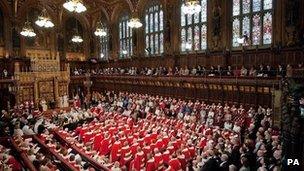Lords reform: Coalition tension mounts amid talk of Lib Dem retaliation
- Published
- comments

The government wants to reduce the number of peers in the House of Lords to 450
Coalition tensions over House of Lords reform have intensified, with the Lib Dems threatening to retaliate if Tory MPs seek to derail the plans.
Up to 100 Tory MPs could revolt in an important vote on Tuesday on plans for a mostly elected chamber - which could endanger the key Lib Dem policy.
Tories have criticised Lib Dem attempts to link the issue to boundary changes.
But senior Lib Dem David Laws said both parties must honour commitments to overhaul the "antiquated" system.
The government wants to make the Lords a mostly elected chamber of Parliament, with the number of members likely to be halved to around 450 and the first elections taking place in 2015.
'Critical moment'
The plan has been spearheaded by Lib Dem leader Nick Clegg and although it is backed by David Cameron, many Tory MPs are unhappy - thinking the proposals are flawed and will result in increased conflict between the new body and the Commons.
MPs will decide next week whether to approve a "timetable motion", which would set out the amount of time for debate on the House of Lords Reform Bill and the terms of its passage through Parliament.
The BBC understands one Conservative MP is prepared to face the sack from their job as a ministerial aide by rebelling against the coalition and others could follow.
Tensions have risen further after Nick Clegg's former director of strategy warned of "consequences" for other political and parliamentary reforms if Tory MPs sought to block the Lords plans.
Speaking to the Independent newspaper, external, Richard Reeves - who stood down as the Lib Dems' director of strategy on Thursday to work in America - said Tuesday's vote was a "critical moment" for Lords reform and "a once-in-a-generation chance" to secure it.
"Anyone who thinks Nick Clegg will shrug his shoulders [after a defeat], say 'never mind' and 'everyone tried our best', will be in for a rude awakening," he added. "That is not going to happen."
BBC political correspondent Vicki Young said Lib Dem insiders have "made it clear" that they are prepared to block the re-drawing of constituency boundaries, a move which is likely to favour the Tories at the next election.
Under the plans, the number of MPs would be reduced from 650 to 600, to allow for a more even spread of voters in each constituency and it is predicted the Conservatives could gain an extra 20 seats as a result.
Despite the row, the Lib Dems said they remained confident Tuesday's motion would be passed and commitments the parties made in their election manifestos and in the coalition agreement must be honoured.
"It is time we reformed this antiquated second chamber," former Cabinet minister Mr Laws told the BBC.
"The prime minister and deputy prime minister have made clear their support for this legislation and we fully expect the votes in the House of Commons to go through and this legislation to be approved."
He added: "We are not planning on the basis of defeats or threats."
'Messing around'
No 10 said the prime minister was determined to press ahead with an overhaul of the Lords and the "usual rules" would apply to any members of the government defying the party whip.
Peter Bone: 'No-one seriously thinks this coalition can stagger on to 2015'
Conservative MPs said a quid pro quo agreement that their party would allow a referendum on the voting system in 2011 in return for Lib Dem support for boundary changes did not extend to Lords reform.
"They (the Lib Dems) just can't be trusted," Peter Bone told the BBC's Daily Politics, adding, with tongue in cheek, that threats of retaliation from his coalition partners had him "quaking in his boots".
"Now because they didn't get what they wanted in AV (alternative vote) they are saying it's all about House of Lords reform".
He added: "I think the Liberals messing around like this just proves the sooner we get to a minority Conservative government the better."
And Conservative colleague Bernard Jenkin tweeted that the Lib Dems "have abandoned any merits of the case for so-called Lords reform in favour of hold on power".
- Published18 June 2012
- Published6 August 2012